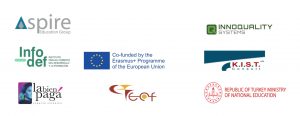

According to the PISA Study, the OECD Programme for International Student Assessment, immigrant students score below non-immigrant students in most PISA-participating countries, both before and after accounting for socio-economic status. So what is the fundamental difference between immigrant students and non-immigrant students if socio-economic status is not responsible? It is that the likelihood increases of immigrant families maintaining a language in the home that is different from the language of school. The maintenance of a different home language to the language of school renders the student at a disadvantage in terms of the acquisition of the language of school, comprehension of teaching and in terms of the feasibility of support with schoolwork.
This issue needs to be addressed as a matter of urgency because it is negatively connected with many disadvantageous outcomes such as decreased capacity to comprehend the education available, increased early school leaving, low literacy levels, decreased employability, an inability to socially integrate fully and ultimately an increased likelihood of a life of poverty.
The project UP TO SPEED has been designed to address, recognize, assist and monitor the linguistic challenges difficulties faced by immigrant families who maintain a different home language to that of the language of school. It offers an innovative teaching method on how to support students from these households through the gamification language learning to afford them increased success at school.
To do so, seven partner institutions, including school authorities, social entities supporting migrants and experts in school education, language learning and ICT based pedagogical technologies from UK, Ireland, Spain, Bulgaria, Turkey and Austria, will work together to design and develop the following products:
- IO1 UP TO SPEED Training Curriculum on how to better support students with a different at home language in a primary school education through innovative pedagogical methods based on digital gamification of language
- IO2 Digital Gamification Tool
- IO3 Digital Assessment Tool
- IO4 Guidelines for Intervention based on Case Studies
- IO5 UP TO SPEED Set of Instructional Videos
The UP TO SPEED digital game will allow teachers to create games which support the acquisition of the language of school, digitally monitor and assess students through a complimentary assessment tool, which provides reports based in visual language of the student’s progress. The games will allow students to challenge a family member or carer into engagement with their schoolwork and if the challenge is accepted it can increase their family member’s / carer’s level of language acquisition by proxy. Given that all languages are structurally different each partner will design and develop UP TO SPEED’S Guidelines for Intervention on a language-by-language basis based on Case Studies from real life contexts in the countries represented by the partnership.
Target users of the project are primary level teachers, support teachers and school leaders;
7 of them will be directly involved in the project activities. Target beneficiaries are immigrant
families who maintain a different home language to that of the language of school.
The project will strengthen the profiles of teaching professionals by supporting their professional
development, increase their ability to deal with diversity in the classroom, improve their linguistic
awareness, provide them with strategies to manage a multilingual classroom and improve their
ICT skills. Through its digital tool output it will facilitate accurate assessment of individual students
and class language acquisition progress and track of the level of support and collaboration of
student’s families and carers through playful competition.
The expected impact of the project UP TO SPEED on participants, participating organisations,
target groups and relevant stakeholders fall under the following categories; pedagogical impact,
impact on the target user training practices and employability, impact on the target groups
readiness for the labour market, impact on the participation of target groups in education, impact
on ICT capabilities and Educational Technological Innovation.
UP TO SPEED will support also schools in tackling early school leaving by increasing the quality of
educational opportunities available, enabling the monitoring of language acquisition to ensure
that a lack of comprehension of course materials is reduced or eliminated as a factor in early
school leaving in Europe.